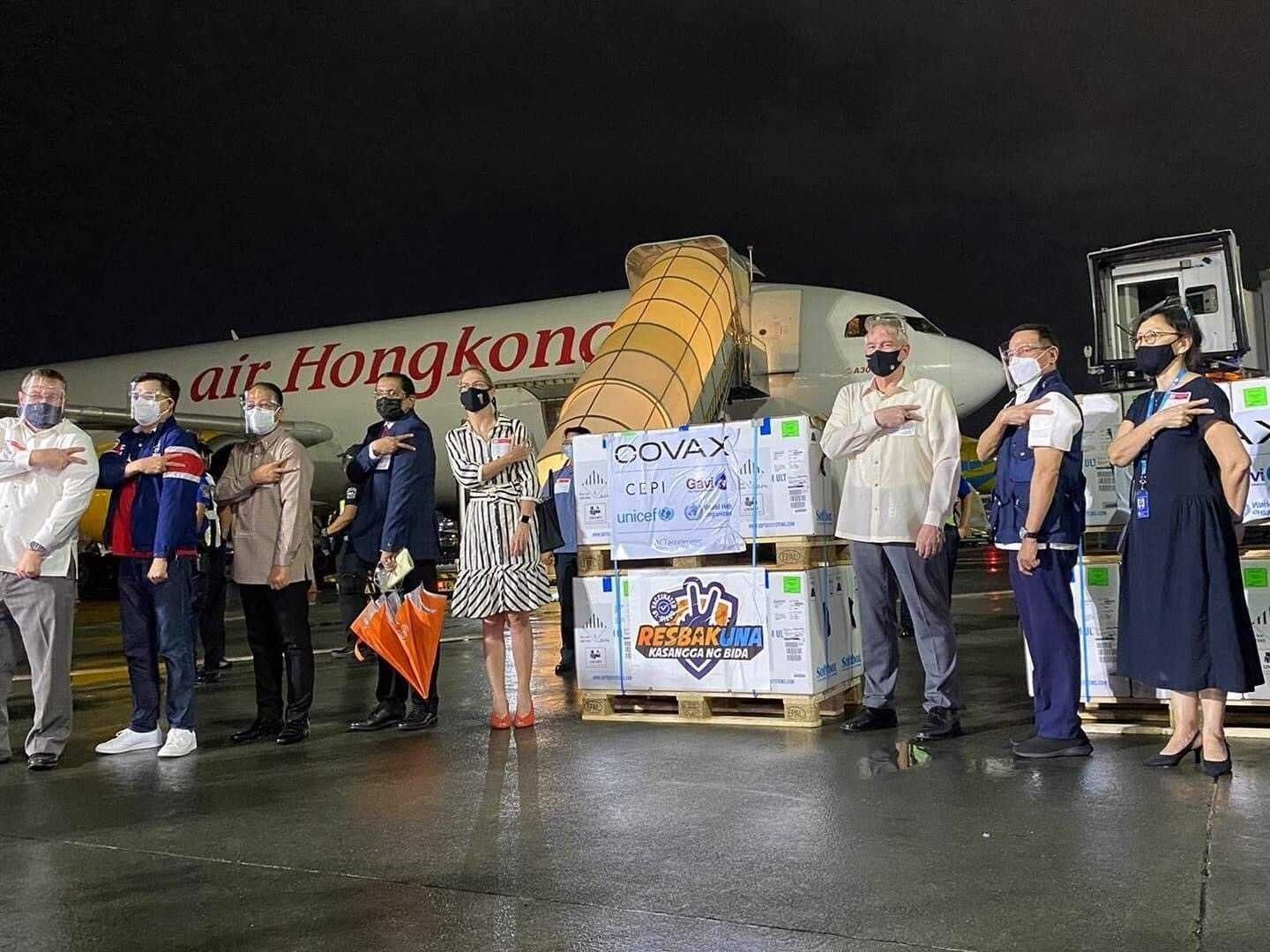Philippines receives 2.2 million Pfizer doses through COVAX

MANILA, Philippines — The Philippines received Thursday night over two million doses of Pfizer-BioNTech COVID-19 vaccines from the COVAX Facility.
US embassy Chargé d’Affaires John Law joined Health Secretary Francisco Duque III, National Task Force against COVID-19 chief implementer and vaccine czar Carlito Galvez Jr., presidential assistant on foreign affairs and chief of presidential protocol Robert Borje and other officials at the Ninoy Aquino International Airport Terminal 3 in welcoming the arrival of 2,282,850 doses of Pfizer-BioNTech vaccines.
This was the biggest shipment of the Pfizer-BioNTech jabs through the COVAX Facility to date.
“And in the weeks and months ahead, ever-increasing quantities of much-needed vaccines will continue to arrive. This shipment will be shared between the cities of Cebu, Davao and Manila,” the US embassy said in a statement yesterday.
Thursday’s delivery was the second tranche of Pfizer-BioNTech vaccines delivered to Manila, following the May 10 arrival of an initial 193,050 doses.
To date, the Philippines has received more than five million vaccines through COVAX, a World Health Organization-led global initiative to support equitable distribution of COVID-19 vaccines. The US is the largest contributor to the COVAX Advance Market Commitment.
Of the more than two million doses that arrived, 1.86 million will go to Manila, 210,600 to Cebu and 210,600 to Davao, the embassy said.
“The United States is committed to leading the global response to the COVID-19 pandemic. And we will continue to support the Philippines’ vaccination and COVID-19 mitigation efforts as its reliable friend, partner and ally,” Law said.
Developed jointly by American pharmaceutical company Pfizer Inc. and German biotechnology company BioNTech SE, the Pfizer-BioNTech COVID-19 vaccine was the first to receive emergency use authorization from the WHO.
It is 95 percent effective in preventing COVID-19 infection, according to the US Food and Drug Administration.
The June 10 arrival is the fifth shipment of COVAX-sourced COVID-19 vaccines to the Philippines, which is among the first countries in the region to receive SARS-CoV-2 vaccines through COVAX.
In total, COVAX will provide 44 million doses to the Philippines, vaccinating one in five Filipinos.
In February, the US announced a total planned contribution of $4 billion or roughly P194.4 billion to the facility.
To date, total US government COVID-19 assistance to the Philippines amounts to nearly $27 million or about P1.3 billion.
Local vaccine
The Department of Science and Technology (DOST) is seeking cooperation with private groups for the development of local COVID-19 vaccines.
“The Philippine government realized that we want to partner with the private sector in the production of, or in ensuring the production of, local COVID vaccines, And therefore, we are willing to put up the necessary policies to make that happen,” Rowena Cristina Guevara, DOST undersecretary for research and development said in an interview with “The Chiefs” on Cignal TV.
The initiative is part of the move to establish the Virology and Vaccine Institute of the Philippines (VVIP).
Guevara said they are eyeing proposing an increase in the minimum percentage allocation for procurement of manufactured vaccines. “Currently, it is set at 15 percent. But then, we need to study for vaccine development, what is the appropriate number,” Guevara said.
“Then there is also the possibility of doing advance market commitment because the initial investments for this manufacturing for vaccine are pretty high,” she added.
“And therefore, the companies might need advanced market commitment from the government which is the largest buyer of vaccines,” she pointed out.
Guevara said eight local pharmaceutical companies are seriously interested in vaccine manufacturing in partnership with foreign biotechnology companies.
“First of all, there are people or scientists and engineers who can be hired by these companies if they decide to manufacture the vaccines locally,” Guevara said.
“There is the capability to do biotechnology which is the needed process for creating vaccines in the country, there are several pharmaceutical companies that can do that,” Guevara pointed out, and that lawmakers are working on the VVIP bill.
“The DPWH (Department of Public Works and Highways) has already started designing the building for the VVIP in New Clark City and we hope to start building next year. So, that facility and the human resource that goes with it will be one that will be able to do R&D on vaccines,” she said.
Warning vs faking records
Meanwhile, the Department of Health (DOH) advised those seeking vaccination to just wait for their turn and not to present fake medical certificates just to get themselves included in priority group A3 or people with comorbidities.
“Our regional offices are able to identify these people because we do screening at the vaccination sites,” DOH Undersecretary Maria Rosario Vergeire said at a press briefing.
She added those presenting fabricated medical certificates can be held liable under the law.
Upon vaccination, those in the A3 list are asked to show “proof or evidence” of comorbidities including doctor’s prescriptions issued six months, medical certificates issued within 18 months and laboratory results. “And if they are found not to be authentic, they are told to wait for their turn,” she said.
“Actually, they do this because they already want to be vaccinated. But all of us will be inoculated at the appropriate time. We are just waiting for more vaccines to come,” she maintained.
“We will have our proper time, you don’t need to fake your documents. You do not have to lie that you have an illness. You will be vaccinated because that is your right,” she added.
The official made the appeal amid reports of vaccine recipients presenting fabricated medical documents.
Last April, six Chinese and nine Filipinos were questioned on suspicion that the medical certificates they presented at a vaccination site in Tondo, Manila were fabricated. – Rainier Allan Ronda, Sheila Crisostomo, Rudy Santos
- Latest
- Trending





























